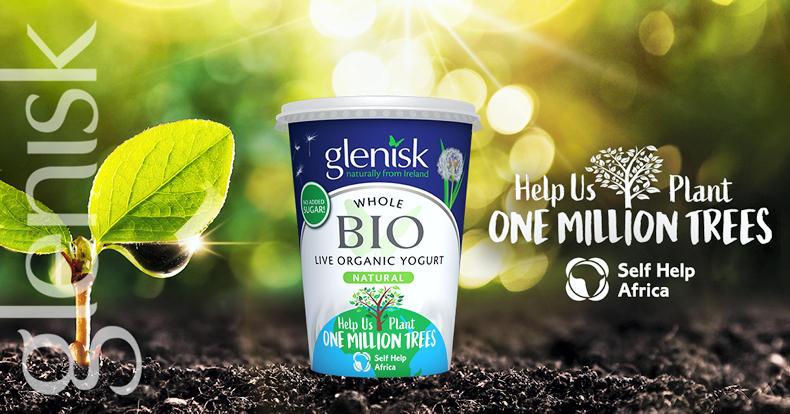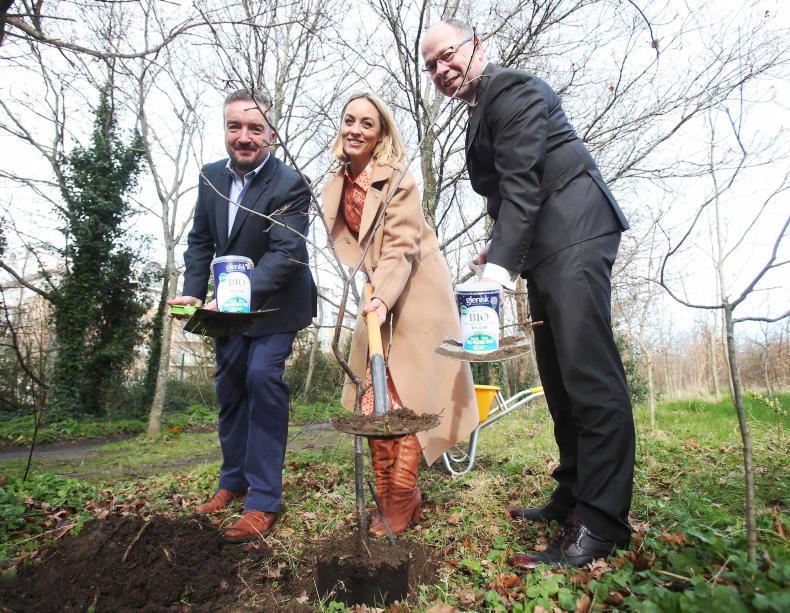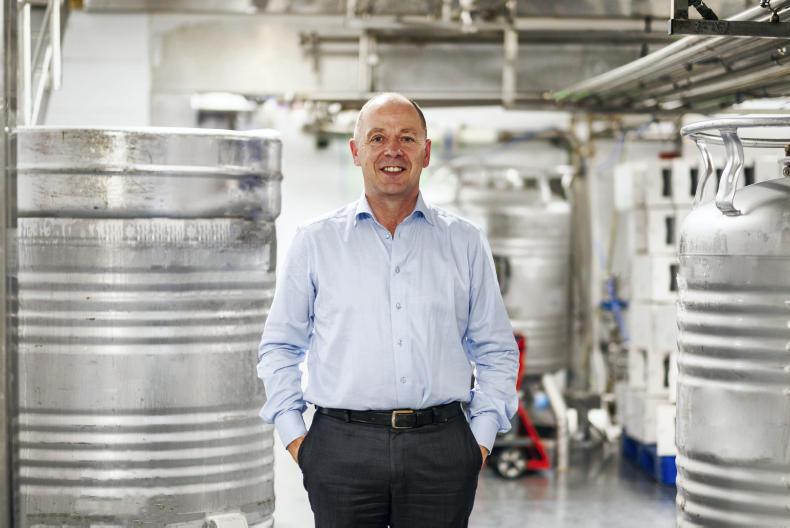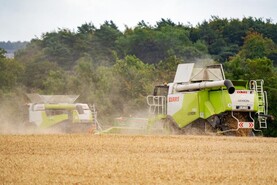Preparing for a phone interview with managing director of Glenisk, Vincent Cleary, I was expecting a quick, 15-minute conversation. We’d discuss how Glenisk are faring during COVID-19, and he would give a run down on their upcoming charitable campaign. “There’s not enough of a story there for print,” I thought to myself. “But it will make a great online article.”
I was wrong. With topics ranging from goat rearing to digital marketing and seemingly everything in between, I came away from the hour-long interview with a renewed vigour for Irish food and an appreciation for how Vincent and several of his 13 siblings have built an Irish yoghurt empire from the ground up.

“They say necessity is the mother of all innovation and, if you’re desperate enough, you will innovate,” he says. “Our development has changed from the bare necessities of 20 years ago.”
While Vincent will admit that business has, by and large, been kind to them, they still endured their share of struggle in the earlier years of their growth.
Starting in 1987, the company was born amidst a different recession. Vincent says that when his father, Jack, looked to expand his dairy business, it was to add value to his milk.
“It was my late father who was the instigator of the business,” he explains. “Back in the early 80s he had set up Tullamore Dairies, which pasteurised milk to supply the locality.”
A silver lining
Tullamore Dairies bottled the milk, as well. When Vincent finished secondary school; he began working at the milk bottling plant. Then, business expanded again – but not in the way you might expect.
“In 1985, my father built a second factory by the milk bottling plant,” Vincent says. “His initial aspiration was to make a Philadelphia-style cream cheese, and then add value to the cheese – so he attempted to make cheesecakes.

“It was 1986; I was nominated as the salesperson for these cheesecakes and I remember driving around in the van trying to sell them. The van was unrefrigerated and I remember 1986 being a particularly warm year, so my cheesecakes were cooking in the back. The cheesecake business ended pretty quickly. Fortunately, the equipment he had installed had dual functionality and was also able to make yoghurt – and we’ve been doing that ever since.”
In the late 80s, Glenisk’s main competitors were larger multinational yoghurt brands. Surprisingly, Vincent says that the majority of all yoghurt bought in Ireland today – even with multiple Irish-made yoghurts being sold – are still the same imported brands.
From there, we secured our little niche in the marketplace
“When we started out, Irish yoghurt was still in its infancy,” he says. “Health yoghurt, as we were pitching, with no added sugar or additives, was a new angle. Fortunately for us, it was successful from the get-go.
“From there, we secured our little niche in the marketplace, but even today, 70% of yoghurt consumed in Ireland is imported. Irish-made yoghurt has grown, but there is still plenty of opportunity for us, and others, to follow up on.”
Vincent took a break from Glenisk throughout the early 90s and lived in Germany. After meeting and marrying his wife there, they moved back to Ireland and he re-entered the family business. Once he returned, he had some interesting ideas on how to grow the business.
A different path
“Another niche we’ve done well with is the fresh goat’s milk,” he says. “It’s been a good product for us, but when we began, it was something completely different. I started out with two goats in my back garden that I got as company for my rescue donkey. Now, we have about 6,000 goats supplying us.”
In the mid-90s, goat’s milk and “going organic” wasn’t as mainstream as it is considered today. Glenisk made the move to organic milk in 1995, around the same time Vincent started milking goats, but in the process he says he was denied loans, mortgages, grants and was seen around town as a bit of a hippie.
“I wasn’t a hippy; I was doing what I needed to do to build the business,” he laughs.
“My wife was a city girl – she had a rude awakening when I purchased 120 goats and seven acres. Combine that with living in a mobile home for seven years – and she had to milk the goats by hand for the first two. She adapted to life in Ireland pretty quickly!”
Despite the rocky road there, Glenisk is widely considered one of Ireland’s most successful food businesses. Vincent and his team have managed well amid the COVID-19 pandemic. Strong communication lines across the business and having their own production and distribution processes in place means they have not had to change their model to fit in to this new way of life.
Their reinvention happened gradually, over the previous two recessions, and today their vision appears well and truly achieved. Doing what they did to survive difficult economic times has worked in their favour.

Kathryn Thomas with Self Help Africa CEO Ray Jordan and Glenisk managing director Vincent Cleary at the launch of 'One Million Trees', at Airfield Estate, Dublin. 'One Million Trees' is sponsored by Glenisk, and is a local-to-global initiative that aims to plant 100,000 native trees in Ireland and one million trees in sub-Saharan Africa this year in a bid to tackle climate change.
“When the economy tanked (in 2008), I brought my siblings into the office and said, ‘We have to go back to our roots; let’s see if there’s anything we did then that we could apply now’,” Vincent reminisces.
We actually grew at a faster rate during the recession
“Because we were so conscious of how we needed to improve and interact with our customers, we survived. We actually grew at a faster rate during the recession (than during the Celtic Tiger years) because we were so focused on making it through.”
Today’s Glenisk is focused on helping others develop while maintaining the integrity of their product line. Self Help Africa is a charitable organisation with whom Glenisk is working with for their One Million Trees campaign. With their retail partner SuperValu, over the next three weeks Glenisk are donating €1 of each purchase of BIO Organic Yogurt 500/450g to Self Help Africa with an aim to plant 1m trees in Africa and a further 100,000 trees in Ireland.
“Ray Jordan (from Self Help Africa) wanted to see if we could help a dairy in Kenya that were struggling a bit,” Vincent says. “Coronavirus has quieted things (on that project), but when it’s safe, we’ll be back to it. We wanted to see what other things we could do right now, to make some kind of positive input on the climate crisis. I had read a quote that said, ‘If you’re going to do one thing for the planet, grow a tree’. So, we decided to do something on that line together.”
We will be planting 100ac of natural forestry by the end of the year
One hundred per cent of proceeds from the campaign will go directly to Self Help Africa and will be used to plant 1m trees in Sub-Saharan Africa. In this spirit, Vincent and the Glenisk team will be replanting Glenisk Wood, which is located on their family farm land in Co Offaly.
“We will be planting 100ac of natural forestry by the end of the year,” he says.
Getting through
a recession
Many Irish businesses are concerned for their future and wonder how they will make it through another Irish recession. Vincent has shared some advice from his years of experience with Glenisk.
1 Be creative
“During the 2008 recession, we had larger packs of 50% free yoghurt, which our accountants weren’t thrilled to see,” he says. “But you worried about the profitability afterwards. We were in that space for nearly four years before the economy starting coming back, towards 2014.”
2 Remind your customers you exist
“A lot of SMEs out there need to differentiate their product. They need their unique selling points and they need to get out in front of their customers and shout about it. To me, that’s the first thing to do in a recession.”
3 Use this time to innovate
“In recessionary times, innovation is usually the first thing that softens,” Vincent says. “In these times, businesses will cut their marketing budget and their product development, but those are the two key things, in my opinion, to get a brand through a recession. Don’t cut too much. Don’t overreact to a recession.”
4 Don’t expect help
“I remember, back in 2008-09, a bank manager telling me that (despite the recession) good businesses will still get loans,” he says. “I spent 10+ years in the wilderness; you need to be prepared for that. For 20 years, we couldn’t get a grant for love nor money because we were seen as so left field.”
5 Believe in yourself
“We’re a shy people at heart,” he says. “You have to get over that and put yourself out there. I wasn’t born with a microphone with my hand; I get stage fright when there’s more than three people in the audience, but it’s sink or swim time. We’re in a recession.”
Preparing for a phone interview with managing director of Glenisk, Vincent Cleary, I was expecting a quick, 15-minute conversation. We’d discuss how Glenisk are faring during COVID-19, and he would give a run down on their upcoming charitable campaign. “There’s not enough of a story there for print,” I thought to myself. “But it will make a great online article.”
I was wrong. With topics ranging from goat rearing to digital marketing and seemingly everything in between, I came away from the hour-long interview with a renewed vigour for Irish food and an appreciation for how Vincent and several of his 13 siblings have built an Irish yoghurt empire from the ground up.

“They say necessity is the mother of all innovation and, if you’re desperate enough, you will innovate,” he says. “Our development has changed from the bare necessities of 20 years ago.”
While Vincent will admit that business has, by and large, been kind to them, they still endured their share of struggle in the earlier years of their growth.
Starting in 1987, the company was born amidst a different recession. Vincent says that when his father, Jack, looked to expand his dairy business, it was to add value to his milk.
“It was my late father who was the instigator of the business,” he explains. “Back in the early 80s he had set up Tullamore Dairies, which pasteurised milk to supply the locality.”
A silver lining
Tullamore Dairies bottled the milk, as well. When Vincent finished secondary school; he began working at the milk bottling plant. Then, business expanded again – but not in the way you might expect.
“In 1985, my father built a second factory by the milk bottling plant,” Vincent says. “His initial aspiration was to make a Philadelphia-style cream cheese, and then add value to the cheese – so he attempted to make cheesecakes.

“It was 1986; I was nominated as the salesperson for these cheesecakes and I remember driving around in the van trying to sell them. The van was unrefrigerated and I remember 1986 being a particularly warm year, so my cheesecakes were cooking in the back. The cheesecake business ended pretty quickly. Fortunately, the equipment he had installed had dual functionality and was also able to make yoghurt – and we’ve been doing that ever since.”
In the late 80s, Glenisk’s main competitors were larger multinational yoghurt brands. Surprisingly, Vincent says that the majority of all yoghurt bought in Ireland today – even with multiple Irish-made yoghurts being sold – are still the same imported brands.
From there, we secured our little niche in the marketplace
“When we started out, Irish yoghurt was still in its infancy,” he says. “Health yoghurt, as we were pitching, with no added sugar or additives, was a new angle. Fortunately for us, it was successful from the get-go.
“From there, we secured our little niche in the marketplace, but even today, 70% of yoghurt consumed in Ireland is imported. Irish-made yoghurt has grown, but there is still plenty of opportunity for us, and others, to follow up on.”
Vincent took a break from Glenisk throughout the early 90s and lived in Germany. After meeting and marrying his wife there, they moved back to Ireland and he re-entered the family business. Once he returned, he had some interesting ideas on how to grow the business.
A different path
“Another niche we’ve done well with is the fresh goat’s milk,” he says. “It’s been a good product for us, but when we began, it was something completely different. I started out with two goats in my back garden that I got as company for my rescue donkey. Now, we have about 6,000 goats supplying us.”
In the mid-90s, goat’s milk and “going organic” wasn’t as mainstream as it is considered today. Glenisk made the move to organic milk in 1995, around the same time Vincent started milking goats, but in the process he says he was denied loans, mortgages, grants and was seen around town as a bit of a hippie.
“I wasn’t a hippy; I was doing what I needed to do to build the business,” he laughs.
“My wife was a city girl – she had a rude awakening when I purchased 120 goats and seven acres. Combine that with living in a mobile home for seven years – and she had to milk the goats by hand for the first two. She adapted to life in Ireland pretty quickly!”
Despite the rocky road there, Glenisk is widely considered one of Ireland’s most successful food businesses. Vincent and his team have managed well amid the COVID-19 pandemic. Strong communication lines across the business and having their own production and distribution processes in place means they have not had to change their model to fit in to this new way of life.
Their reinvention happened gradually, over the previous two recessions, and today their vision appears well and truly achieved. Doing what they did to survive difficult economic times has worked in their favour.

Kathryn Thomas with Self Help Africa CEO Ray Jordan and Glenisk managing director Vincent Cleary at the launch of 'One Million Trees', at Airfield Estate, Dublin. 'One Million Trees' is sponsored by Glenisk, and is a local-to-global initiative that aims to plant 100,000 native trees in Ireland and one million trees in sub-Saharan Africa this year in a bid to tackle climate change.
“When the economy tanked (in 2008), I brought my siblings into the office and said, ‘We have to go back to our roots; let’s see if there’s anything we did then that we could apply now’,” Vincent reminisces.
We actually grew at a faster rate during the recession
“Because we were so conscious of how we needed to improve and interact with our customers, we survived. We actually grew at a faster rate during the recession (than during the Celtic Tiger years) because we were so focused on making it through.”
Today’s Glenisk is focused on helping others develop while maintaining the integrity of their product line. Self Help Africa is a charitable organisation with whom Glenisk is working with for their One Million Trees campaign. With their retail partner SuperValu, over the next three weeks Glenisk are donating €1 of each purchase of BIO Organic Yogurt 500/450g to Self Help Africa with an aim to plant 1m trees in Africa and a further 100,000 trees in Ireland.
“Ray Jordan (from Self Help Africa) wanted to see if we could help a dairy in Kenya that were struggling a bit,” Vincent says. “Coronavirus has quieted things (on that project), but when it’s safe, we’ll be back to it. We wanted to see what other things we could do right now, to make some kind of positive input on the climate crisis. I had read a quote that said, ‘If you’re going to do one thing for the planet, grow a tree’. So, we decided to do something on that line together.”
We will be planting 100ac of natural forestry by the end of the year
One hundred per cent of proceeds from the campaign will go directly to Self Help Africa and will be used to plant 1m trees in Sub-Saharan Africa. In this spirit, Vincent and the Glenisk team will be replanting Glenisk Wood, which is located on their family farm land in Co Offaly.
“We will be planting 100ac of natural forestry by the end of the year,” he says.
Getting through
a recession
Many Irish businesses are concerned for their future and wonder how they will make it through another Irish recession. Vincent has shared some advice from his years of experience with Glenisk.
1 Be creative
“During the 2008 recession, we had larger packs of 50% free yoghurt, which our accountants weren’t thrilled to see,” he says. “But you worried about the profitability afterwards. We were in that space for nearly four years before the economy starting coming back, towards 2014.”
2 Remind your customers you exist
“A lot of SMEs out there need to differentiate their product. They need their unique selling points and they need to get out in front of their customers and shout about it. To me, that’s the first thing to do in a recession.”
3 Use this time to innovate
“In recessionary times, innovation is usually the first thing that softens,” Vincent says. “In these times, businesses will cut their marketing budget and their product development, but those are the two key things, in my opinion, to get a brand through a recession. Don’t cut too much. Don’t overreact to a recession.”
4 Don’t expect help
“I remember, back in 2008-09, a bank manager telling me that (despite the recession) good businesses will still get loans,” he says. “I spent 10+ years in the wilderness; you need to be prepared for that. For 20 years, we couldn’t get a grant for love nor money because we were seen as so left field.”
5 Believe in yourself
“We’re a shy people at heart,” he says. “You have to get over that and put yourself out there. I wasn’t born with a microphone with my hand; I get stage fright when there’s more than three people in the audience, but it’s sink or swim time. We’re in a recession.”









 This is a subscriber-only article
This is a subscriber-only article









SHARING OPTIONS: